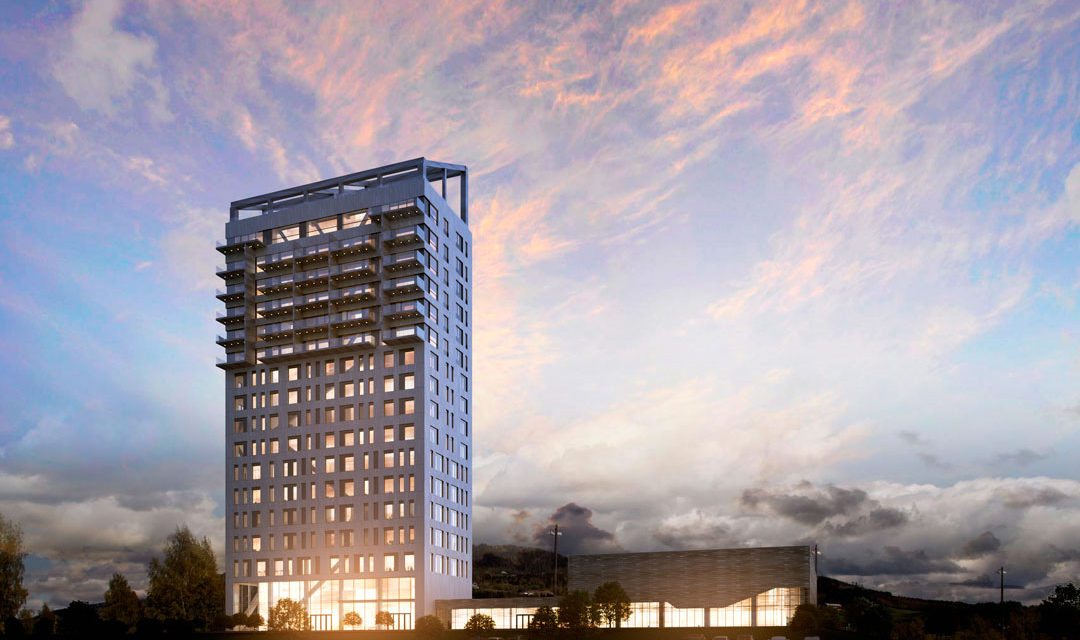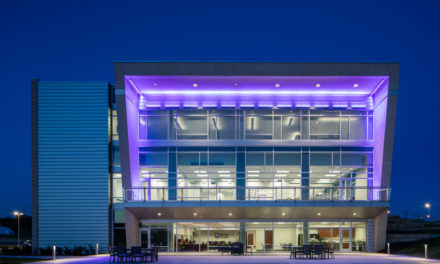When completed in March 2019, Mjøsa Tower in the Norwegian town of Brumunddal will be the world’s tallest wooden building. The construction, which started in early April this year, is an example of how wood can be substituted for concrete. The 18 story-building will stand over 80 meters tall, housing offices, a hotel and apartments.
According to Metsä Wood, wooden buildings are the solution to the high demand for new housing and offices, urban densification and stringent environmental demands. Using wood as the main building material produces lightweight and cost-effective buildings that are quick to build and have minimal environmental impact. This also applies to load-bearing elements.
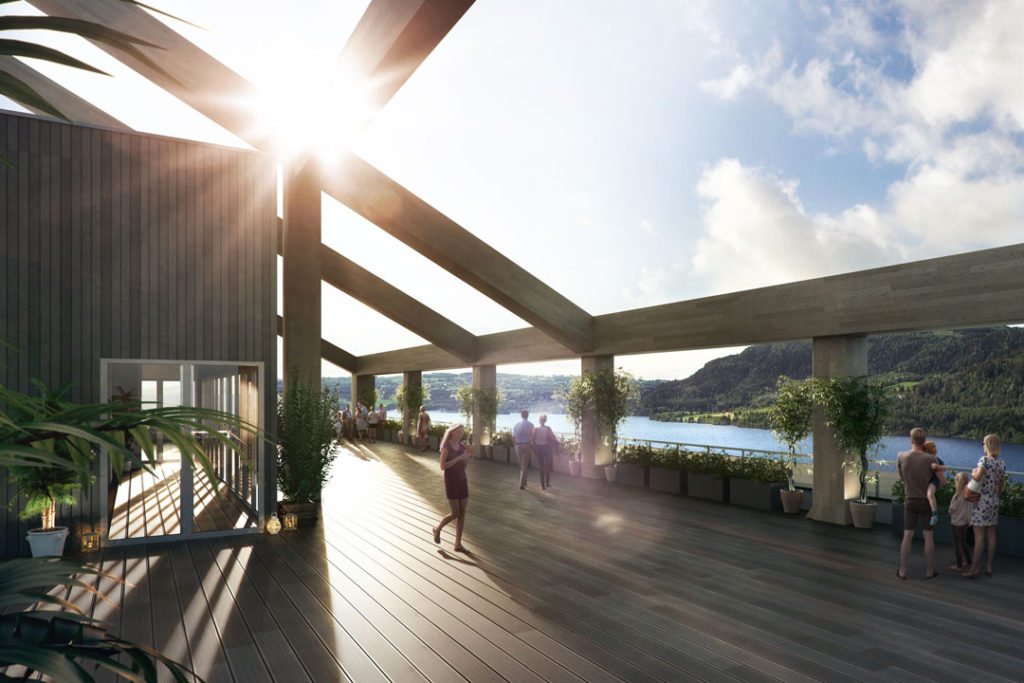
When completed in March 2019, Mjøsa Tower in the Norwegian town of Brumunddal will be the world’s tallest wooden building. Credit: Voll Arkitekter AS and EVE Images
The environment
This high-rise is being built using glulam, CLT and Metsä Wood’s Kerto® LVL (laminated veneer lumber). To ensure the required load-bearing capacity, cross-bonded veneer panels called Kerto-Q LVL, will be used for the flooring between the storys. The panels are extremely strong and durable.
Wood is an environmentally-friendly building material. As a raw material, it is renewable and abundantly available in the Nordic countries. The material absorbs more carbon dioxide as the tree grows than the quantities emitted in the manufacture of this construction material. The wood’s light weight means less transportation and lighter foundations of the kind required for concrete buildings.
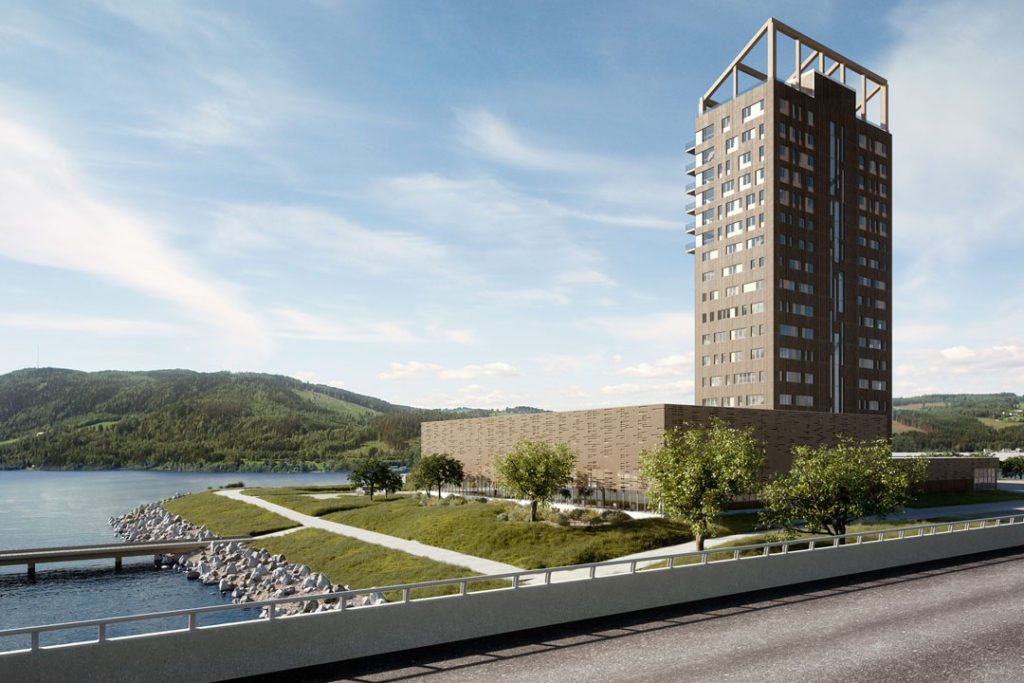
Credit: Voll Arkitekter AS and EVE Images
Construction time
Using wood as the main construction material, even in high-rise buildings, is key to shortening the construction time and, consequentially, cost. Modern technology enables the prefabrication of all components in a factory, with a very high degree of precision. Compared to cast-in-situ concrete, wood makes it possible for construction time to be slashed by half. In addition, it’s relatively easy to make adjustments or corrections on-site.
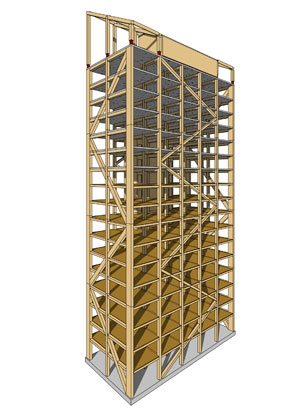
Using wood as the main construction material is key to shortening the construction time and, consequentially, cost. Credit: Moelven / Sweco
“The floor structures, which consist of massive beams with Kerto panels on top, are assembled in our factory, just 15 kilometers from the construction site. Obviously, that’s a huge advantage if you have something that needs to be adjusted at the factory. The work is progressing at the rate of one story a week, which has shortened our construction time by approximately 35 to 40 per cent compared to using cast-in-site concrete. And since the wooden components are so lightweight, we don’t need the machinery to be as heavy,” says Rune Abrahamsen, Managing Director of Moelven Limtre AS, a general subcontractor in the Mjøsa Tower project.
Fire safety
Fire safety is not a weak point in the wooden Mjøsa Tower. Untreated solid wood creates its own fire-resistant surface because the outermost layer chars when exposed to fire, protecting against further fire damage.
In fact, wood is a fireproof material despite the commonly held belief that it isn’t. “Fire safety rules state that buildings must be able to withstand a full fire for at least two hours without collapsing. When you have a building made of steel and concrete, the steel melts and the building collapses,” says Erik Tveit, Project Manager at HENT AS, the general contractor for the site.
Nevertheless, concrete will be used between the floors of the Tower’s top seven storeys. Using concrete has nothing to do with the load-bearing capacity. There’s a simpler explanation: the swaying that increases the higher you get in a building built of wood or concrete. The weight of the concrete in the upper storeys makes the swaying slower and not as readily perceivable.
Metsä Wood is supplying Kerto LVL to Moelven Limtre AS, which is constructing the wooden frame for the general contractor HENT.
Metsä Wood provides competitive and environmentally friendly wood products for construction, industrial customers and distributor partners. We manufacture products from northern wood, a sustainable raw material of premium quality. Our sales in 2016 were EUR 0.5 billion, and we employ about 1,500 people. Metsä Wood is part of Metsä Group.

